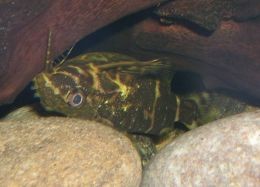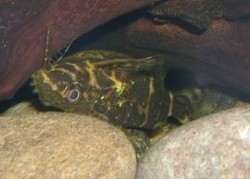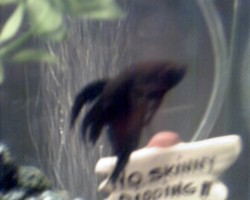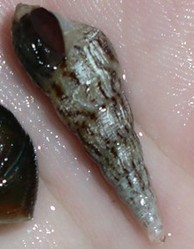Many years after that, at some point in the nineties, I had a large tropical fish tank in my kitchen in my house in Ely and among the fish I had in it were a pair of some species of mouthbreeder cichlid. What the species was I don't know and neither did the shop I got them from.
Amongst the cichlids, which are a very large group of fish species, there are many types that choose mates they stay faithful too. In other words they are monogamous and mate for life and such species have a strong sense of pair-bonding.
There are many types of cichlid, which use the mouthbrooding method of rearing their fry. This means that the female gathers up the fertilised eggs into her mouth and keeps them there until they hatch. After they are free swimming they can dart back into their mother's mouth for safety. While she is incubating the eggs the mother fish does not eat at all because it would not be safe for her eggs for her to do so.
The type of mouthbreeding cichlid I had were obviously one of the species that mates for life and I saw an example of how a fish can feel emotion because the female of my pair of fish died and after that the male went downhill fast. In this species it is normal behaviour for the male to dig a pit in the sand and in this the female would lay her eggs. This type of cichlid and many other varieties spend a lot of time shifting the gravel about in tanks and because of this are not good to keep if you want an attractive underwater garden.
After my male lost his wife he stopped digging pits in the gravel because he knew he had no mate to do this for any more. He also went off his food and began to conspicuously mope about and just stayed motionless in a corner of the aquarium showing no interest in anything. I knew what I was looking at was a case of extreme depression in a fish who was dying from a broken heart.
There was nothing I could do about it and resigned myself to having to sadly see him pine away. At this point, however, my friends Pixi and Sioned called around to see me. Sioned went in the kitchen and looking inside my tank asked me what was the matter with my big fish. I explained that his wife had died and I thought he would die too now because he was very depressed and had stopped eating.
Sioned, unlike me, was not prepared to give up on the fish and she started tapping on the glass side and talking to him through it. She came to call the next day too and the day after and each time she spent ages in front of the tank trying to get the old fish's attention by tapping the glass and talking to him.
Amazingly this worked and the male cichlid started swimming about again and eating. I could see that his recovery was definitely down to the nursing my friend Sioned had given the fish. She had been giving him the love and attention he needed and he got well again.
Both of these two incidents taught me two invaluable lessons: firstly that whilst there is life there is hope and that Mother Nature can accomplish miraclulous healings, and secondly that fish can have emotions that affect them just as much as human emotions can affect us.
Copyright © 2012 Steve Andrews. All Rights Reserved.









 What to see and do in Icod de los Vinoson 06/28/2016
What to see and do in Icod de los Vinoson 06/28/2016
 Herbs of the Sun, Moon and Planets is the follow up to Herbs of the Northern Shamanon 10/03/2015
Herbs of the Sun, Moon and Planets is the follow up to Herbs of the Northern Shamanon 10/03/2015
 Music for Pagan Weddingson 03/07/2013
Music for Pagan Weddingson 03/07/2013
 Los Silos is part of Tenerife’s Low Island or Isla Bajaon 02/23/2013
Los Silos is part of Tenerife’s Low Island or Isla Bajaon 02/23/2013



Comments